北师大版(2019)高中英语必修第三册 UnIt9 LearningLesson 3 The Secrets of Your Memory公开课课件(40张)
文档属性
| 名称 | 北师大版(2019)高中英语必修第三册 UnIt9 LearningLesson 3 The Secrets of Your Memory公开课课件(40张) |
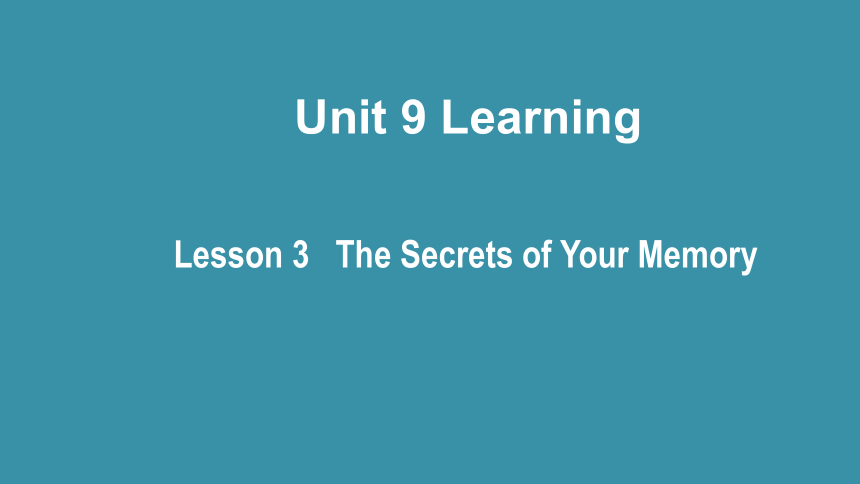
|
|
| 格式 | pptx | ||
| 文件大小 | 1.6MB | ||
| 资源类型 | 教案 | ||
| 版本资源 | 北师大版(2019) | ||
| 科目 | 英语 | ||
| 更新时间 | 2023-03-07 22:01:05 | ||
图片预览

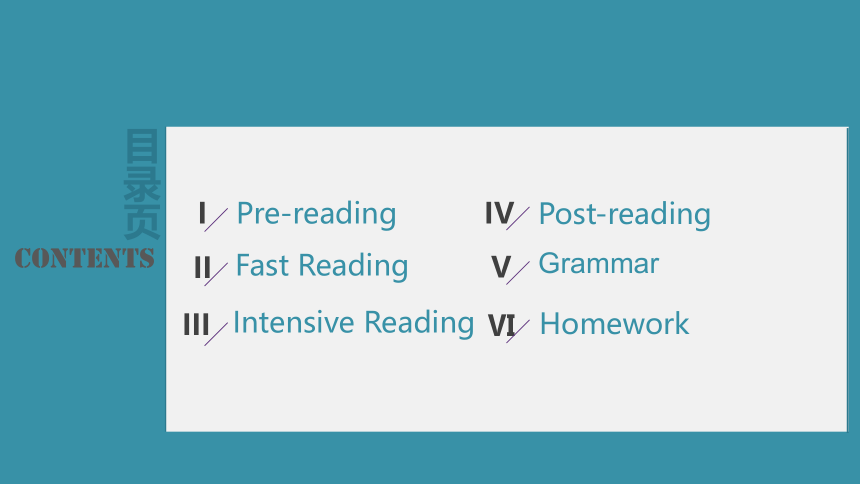

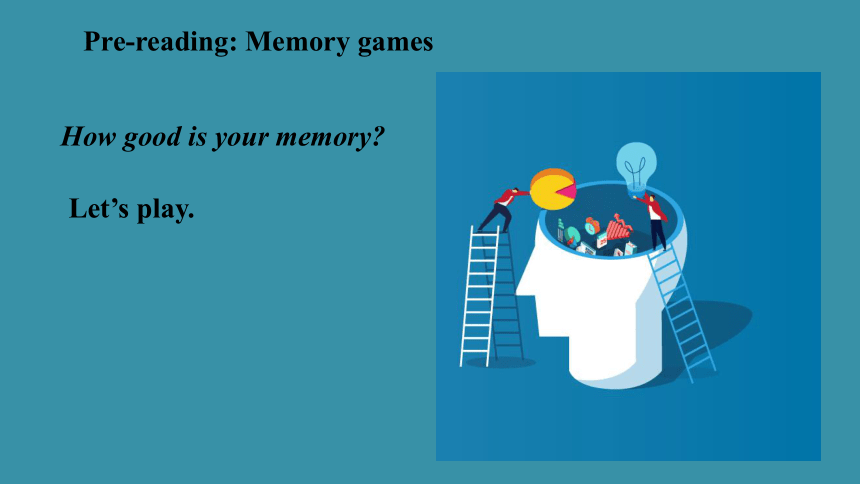
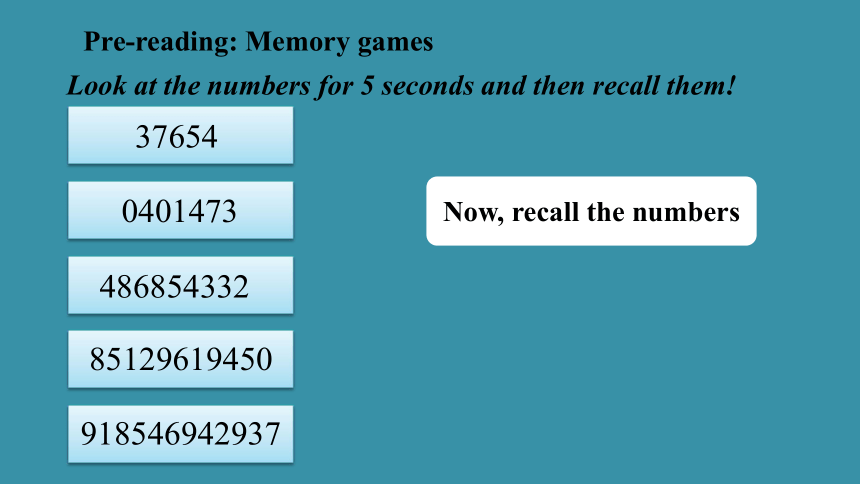
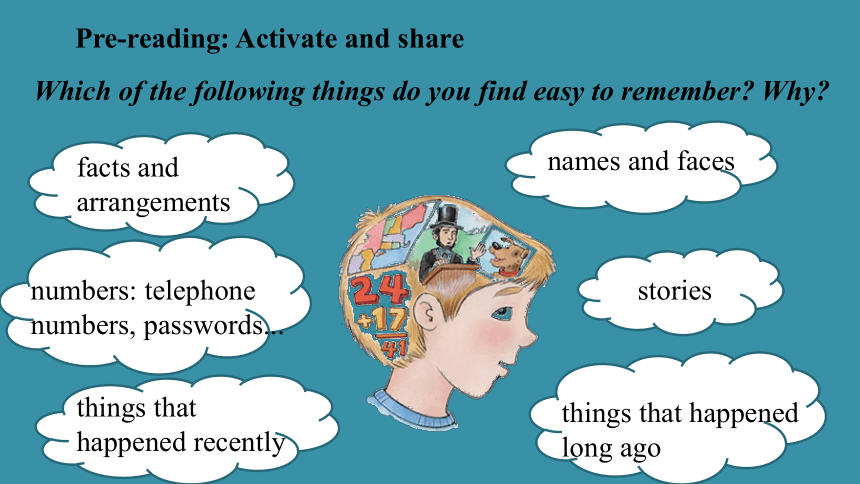
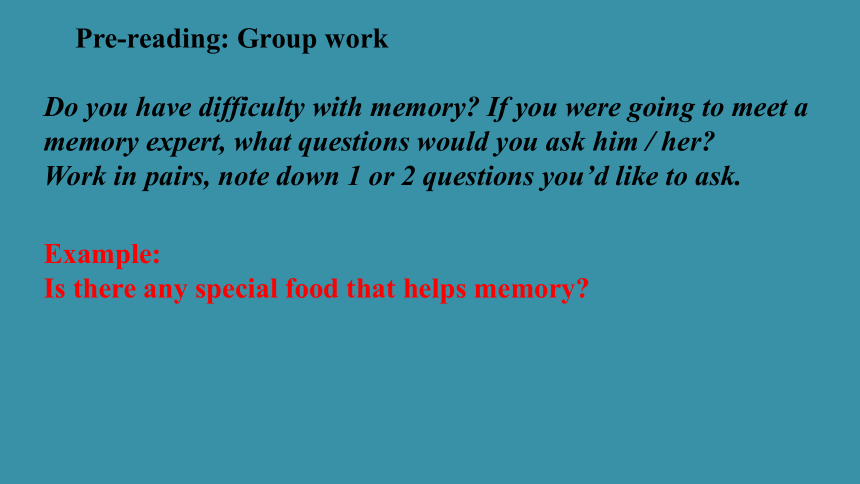

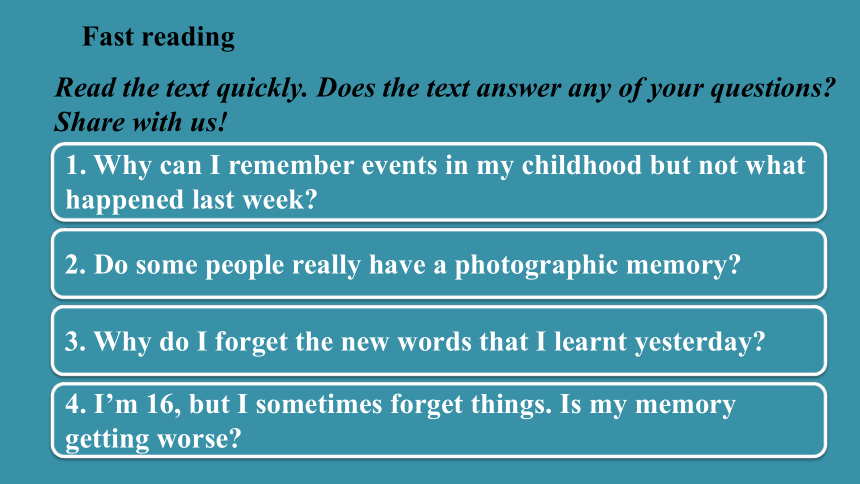
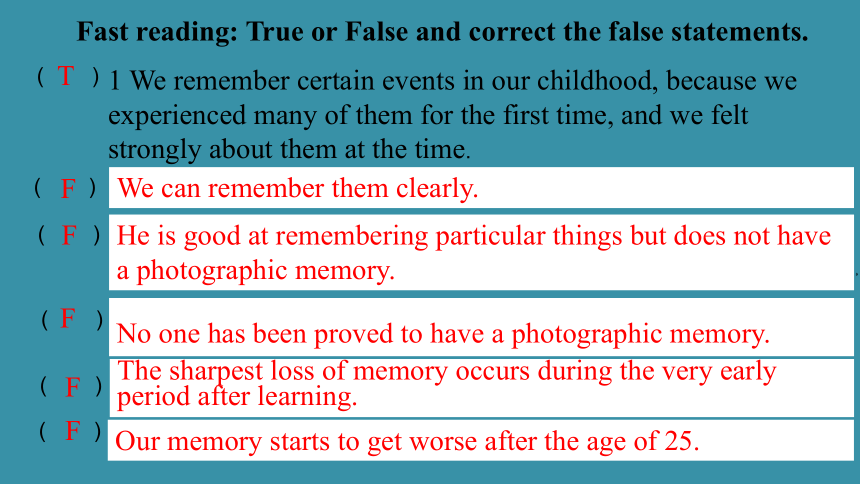
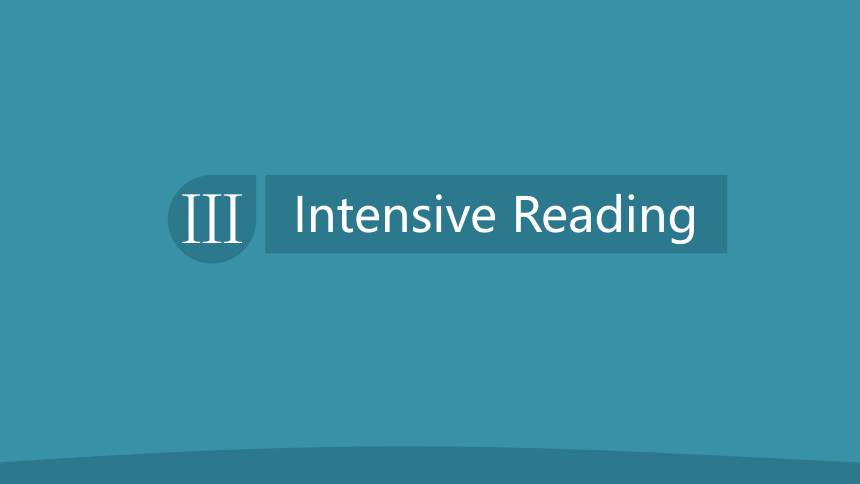
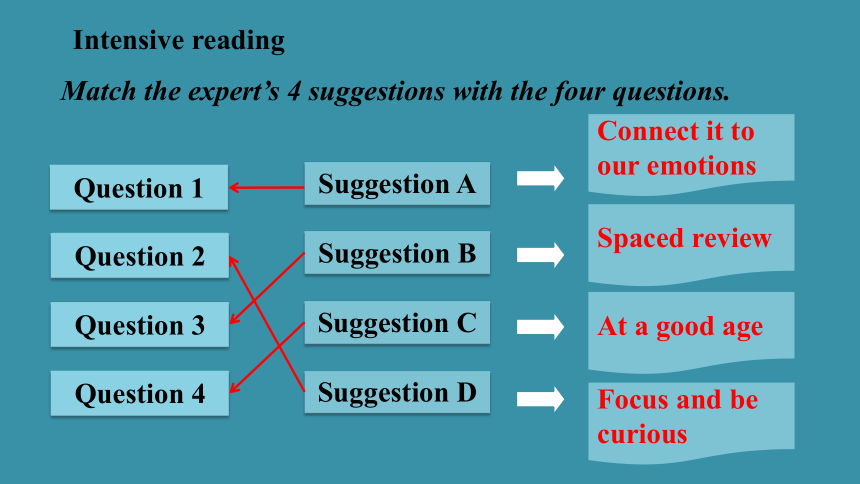
文档简介
(共40张PPT)
Unit 9 Learning
Lesson 3 The Secrets of Your Memory
目录页
contents
Pre-reading
I
Post-reading
IV
Fast Reading
II
Grammar
V
III
Intensive Reading
Ⅵ
Homework
Pre-reading
Ⅰ
Pre-reading: Memory games
Let’s play.
How good is your memory
Now, recall the numbers
37654
0401473
486854332
85129619450
918546942937
Look at the numbers for 5 seconds and then recall them!
Pre-reading: Memory games
Pre-reading: Activate and share
Which of the following things do you find easy to remember Why
names and faces
facts and arrangements
stories
things that happened long ago
things that happened recently
numbers: telephone numbers, passwords...
Do you have difficulty with memory If you were going to meet a memory expert, what questions would you ask him / her
Work in pairs, note down 1 or 2 questions you’d like to ask.
Pre-reading: Group work
Example:
Is there any special food that helps memory
Ⅱ
Fast Reading
Fast reading
Read the text quickly. Does the text answer any of your questions Share with us!
1. Why can I remember events in my childhood but not what happened last week
2. Do some people really have a photographic memory
3. Why do I forget the new words that I learnt yesterday
4. I’m 16, but I sometimes forget things. Is my memory getting worse
Fast reading: True or False and correct the false statements.
1 We remember certain events in our childhood, because we experienced many of them for the first time, and we felt strongly about them at the time.
( )
( )
( )
( )
( )
( )
2 When we tell a story many times, we forget important details.
3 Stephen Wiltshire has a photographic memory because he can draw a detailed picture of a city from memory after flying over it.
4 It has been proved that some people have a photographic memory.
5 The sharpest loss of memory occurs during the first five days.
6 Our memory starts to get worse in middle age.
F
F
F
F
F
T
We can remember them clearly.
He is good at remembering particular things but does not have a photographic memory.
No one has been proved to have a photographic memory.
The sharpest loss of memory occurs during the very early period after learning.
Our memory starts to get worse after the age of 25.
Ⅲ
Intensive Reading
Intensive reading
Question 1
Question 2
Question 3
Question 4
Suggestion A
Suggestion B
Suggestion C
Suggestion D
Connect it to our emotions
Spaced review
At a good age
Focus and be curious
Match the expert’s 4 suggestions with the four questions.
Intensive reading
Find out the truths and advice that Jemima Gryaznov gives about memory.
Question 1
Truth
We remember things that have strong connections in our mind, especially emotional connections.
Advice
We need to make strong connections with things we want to remember in our mind, especially emotional connections.
Intensive reading
Question 2
Truth
Nobody has a photographic memory.
Advice
We need to focus on the important ideas and be curious about what we learn when memorising complex learning materials.
Intensive reading
Question 3
Truth
The sharpest loss of memory occurs during the very early period after learning.
Advice
We need to review the information at regular intervals, especially in the first day after learning it.
Intensive reading
Question 4
Truth
Our memory reaches its full power at the age of 25.
Advice
We need to train our memory to remember more when we’re older.
Post-reading
Ⅳ
Post-reading: Summary
Post-reading: Group work
How has the expert tried to make her statements to each question convincing What methods has she used and what signal words can you find
To make her statements convincing the expert used:
examples: For example …
figures: a famous forgetting curve
quote: According to …
numbers: 25, 200, 40
Post-reading
Think about more ways to improve our memory.
Ⅴ
Grammar
Teacher: Ok, everyone. Let’s discuss something that many of you find difficult —1 ___________ new words. Does anyone have any 2 __________ advice on the best way to do this
Student 1: I think it’s good to try and organize new words by 3 _______. So, for example, if I have words related to “school”, I can write a 4 ________ list of all the vocabulary I can think of under that heading.
Student 2: That’s a good idea but even if I write lists, I still forget so many words. I think I just have a bad 5 _________.
memory significantly effective particular theme
materials focus therefore detailed memorising
memorising
particular
theme
detailed
memory
Focus on Language: Important words and phrases
Student 3: Well, when you learn new words in your coursebook it’s also useful to try and find them in other English language 6 ________. Read online articles or English literature and keep an eye out for the new words.
Student 4: That’s good advice but I wouldn’t 7 _______ too much on simply reading words. When you learn a new word, use it in spoken English. It 8 ___________ improves your ability to remember words if you’ve already used them in a conversation. 9 ___________, you must develop your speaking skills.
Teacher: Good ideas, everyone. I agree that speaking is the most 10 ________ way of remembering new words and phrases but everyone is different, so find the approach that works best for you.
materials
focus
significantly
Therefore
effective
Focus on Language: Important words and phrases
1. This is because when we experience things for the first time, we often have strong feelings of fear or excitement.
这是因为我们第一次经历事物时,常常会产生强烈的恐惧感或者兴奋感。
This is because ... 这是因为…… This is why ... 这是为什么……
From space, the earth looks blue. This is ________ about seventy-one percent of its surface is covered by water.
Smoking does harm to your health. That is _______ millions of people die from the habit.
why
because
Focus on Language: Important sentences
2. As a result, we remember them much better, as telling events helps fix experiences in our memories.
重复事件能加强我们对事件的印象,我们能更好的记住这些经历。
as 常见的固定短语:
as a result / as a result of (由于……的结果) as a whole (就整体来说) as follows (如下 ) as above (如上) as usual (照常) / as a (general) rule (通常) as a matter of fact (事实上) as soon as possible / as early as possible / as quickly as possible
Focus on Language: Important sentences
as 作连词的用法:
1. 引导时间状语从句。与while意义相近,强调两个动作同时发生;或
某事一发生,另一事立刻发生。eg:
① He shouted aloud as he ran along.
② I was startled as he opened the door.
③ We get wiser as we get older.
2. 引导原因状语从句,与because的用法相近。
① As it was getting very late, we soon turned back.
② We must stop writing now, as I have rather a lot of work to do.
Focus on Language: Important sentences
as 作连词的用法:
3. 引导方式状语从句,作“正如,好像,按照”解。主要的句式有as if / as though; just as / just as … as. eg:
① When in Rome, do as Romans do.
② We do farm work as the old peasant teaches us.
4. 引导让步状语从句;作“虽然,尽管”解。这时从句常用倒状语序,即把从句中的表语、状语或动词原形放在as之前。eg:
① Child as she is, she knows a lot.
② Busy as he is, he insists on studying.
③ Try as he might, Tom could not get out of the difficulties.
Focus on Language: Important sentences
3. When remembering something new, try to connect it to our emotions.
要记住新内容,试着把内容和情感建立联系。
在含有状语从句的复合句中
1. when, while, as, once, whenever引导的时间状语从句; 2. if, unless引导的条件状语从句;
3. though, although, even if, even though引导的让步状语从句;
4. as though, as if, as引导的方式状语从句;
5. wherever引导的地点状语从句。
若从句的主语与主句的主语相同,且在谓语中含有be时,常省略从句的主语和be。
Focus on Language: Important sentences
1. ______________________ (在北京的时候), I paid a visit to the Summer Palace.
2. _____________________ (当是个年轻人的时候), Abraham Lincoln was a storekeeper and a postmaster.
3. He has no money. ______ (要是有的话), he will give us. 4. ______________ (除非修理), the machine is of no use. 5. ______________________ (要是给更多的关注), the boy could have turned out better.
6. A girl stood at the gate of the school as if ____________________
(正在跟老师讲话).
When / While in Beijing
When / As a young man
If any
Unless repaired
If given more attention to
talking with a teacher
Focus on Language: Important sentences
1. Retelling events _______ (help) fix experiences in our memories.
2. There ________ (be) some people who do have amazing memories.
3. They _______ (be) both good at remembering particular things for a limited time.
4. One of the golden rules to increase how much we remember ___ (be) to review the material periodically.
Sentence Builder
Circle the subjects of the sentences in the sentence builder. Then use the correct form of the verbs to complete the sentences.
Focus on Grammar: Subject-Verb Agreement
helps
are
are
is
主谓一致是指主语和谓语要保持人称和数上的一致,主语的“人称”和“数”决定谓语动词的变化。
但是如果主语不是单一的,或主语名词的数比较特殊时,其主谓一致一般要根据语法一致\意义一致\就近原则.
Focus on Grammar: Subject-Verb Agreement
1. and连接两个或两个以上单数名词或者代词作主语的时候,谓语动词用复数。
(1) He and I ____ both students of this school.
(2) Both rice and wheat grown in this part of China. (be)
注意:由and连接的两个并列主语指同一个人或物,谓语动词用单数,这时后面的名词前没有冠词。
1) The worker and writer ______ our school today. (visit)
2) The worker and the writer _________ to the meeting. (have come / has come)
have come
visits
are
are
语法一致原则
Focus on Grammar: Subject-Verb Agreement
2. 当主语后面跟有as well as, as much as, along with, with, together with , like, rather than, but, except, besides, including等引导的词组时,其谓语动词的单、复数由主语的单、复数而定。
The teacher with two students ______ (be) at the meeting .
E-mail, as well as the telephones, ____________ (play) an important part in daily communication.
A library with five thousand books ___ (be) offered to the nation as a gift.
Nobody but Jane ________ (know) the secret.
is
is playing
is
knows
语法一致原则
Focus on Grammar: Subject-Verb Agreement
3.当主语由不定式、动名词或疑问词引导的句子充当时,谓语动词用单数。
1) To hold the Olympic Games ____ (be) a rich prize for a country. 2) Choosing what to eat ___ no longer as easy as it once was.
3) What we need ____ (be) more time and more materials.
由what, who, why, how, whether等引导的主语从句,谓语动词通常用单数,(但所指的具体内容为复数意义,则可以用复数形式: (What we need are teachers.)
is
is
is
语法一致原则
Focus on Grammar: Subject-Verb Agreement
1. Collective nouns(集体名词)
由集体名词,如group, family, class, government, team, enemy, crowd, company, audience等作主语时,如果看一个整体,谓语动词用单数形式,如果看成其中各成员,则用复数形式。
注意:集体名词为 people, police, 谓语动词用复数
eg: The police are searching for the thief.
意义一致原则
Focus on Grammar: Subject-Verb Agreement
2. Indefinite pronouns(不定代词)
不定代词everybody, everyone, everything, anyone, anybody, anything, someone, somebody, something, nobody, no one, nothing, each, the other 等作主语时,谓语动词用单数。
1. Nothing _____ (be) difficult in the world if you set your mind to it.
2. Everything (be) ready.
3. Someone _______ (want) to see you.
is
is
wants
意义一致原则
Focus on Grammar: Subject-Verb Agreement
就近原则
Focus on Grammar: Subject-Verb Agreement
A or B
Not A but B
Either A or B
Neither A nor B
Not only A but also B
+ Verb
Here
There
+ Verb
A and B
A , B and C
1. Not only you but also he ____ wrong. (is / are)
2. Neither you nor he ___ right. (is / are)
3. There ____ two shops and a cinema beside the railway station. (is / are)
4. Here ____ a map and a handbook for you. (is / are)
is
is
are
is
就近原则
Focus on Grammar: Subject-Verb Agreement
VI
Homework
Homework
Read the tips on Page 61 for improving your memory. Which tips seem most / least useful Which, if any, would be useful for English learning
Unit 9 Learning
Lesson 3 The Secrets of Your Memory
目录页
contents
Pre-reading
I
Post-reading
IV
Fast Reading
II
Grammar
V
III
Intensive Reading
Ⅵ
Homework
Pre-reading
Ⅰ
Pre-reading: Memory games
Let’s play.
How good is your memory
Now, recall the numbers
37654
0401473
486854332
85129619450
918546942937
Look at the numbers for 5 seconds and then recall them!
Pre-reading: Memory games
Pre-reading: Activate and share
Which of the following things do you find easy to remember Why
names and faces
facts and arrangements
stories
things that happened long ago
things that happened recently
numbers: telephone numbers, passwords...
Do you have difficulty with memory If you were going to meet a memory expert, what questions would you ask him / her
Work in pairs, note down 1 or 2 questions you’d like to ask.
Pre-reading: Group work
Example:
Is there any special food that helps memory
Ⅱ
Fast Reading
Fast reading
Read the text quickly. Does the text answer any of your questions Share with us!
1. Why can I remember events in my childhood but not what happened last week
2. Do some people really have a photographic memory
3. Why do I forget the new words that I learnt yesterday
4. I’m 16, but I sometimes forget things. Is my memory getting worse
Fast reading: True or False and correct the false statements.
1 We remember certain events in our childhood, because we experienced many of them for the first time, and we felt strongly about them at the time.
( )
( )
( )
( )
( )
( )
2 When we tell a story many times, we forget important details.
3 Stephen Wiltshire has a photographic memory because he can draw a detailed picture of a city from memory after flying over it.
4 It has been proved that some people have a photographic memory.
5 The sharpest loss of memory occurs during the first five days.
6 Our memory starts to get worse in middle age.
F
F
F
F
F
T
We can remember them clearly.
He is good at remembering particular things but does not have a photographic memory.
No one has been proved to have a photographic memory.
The sharpest loss of memory occurs during the very early period after learning.
Our memory starts to get worse after the age of 25.
Ⅲ
Intensive Reading
Intensive reading
Question 1
Question 2
Question 3
Question 4
Suggestion A
Suggestion B
Suggestion C
Suggestion D
Connect it to our emotions
Spaced review
At a good age
Focus and be curious
Match the expert’s 4 suggestions with the four questions.
Intensive reading
Find out the truths and advice that Jemima Gryaznov gives about memory.
Question 1
Truth
We remember things that have strong connections in our mind, especially emotional connections.
Advice
We need to make strong connections with things we want to remember in our mind, especially emotional connections.
Intensive reading
Question 2
Truth
Nobody has a photographic memory.
Advice
We need to focus on the important ideas and be curious about what we learn when memorising complex learning materials.
Intensive reading
Question 3
Truth
The sharpest loss of memory occurs during the very early period after learning.
Advice
We need to review the information at regular intervals, especially in the first day after learning it.
Intensive reading
Question 4
Truth
Our memory reaches its full power at the age of 25.
Advice
We need to train our memory to remember more when we’re older.
Post-reading
Ⅳ
Post-reading: Summary
Post-reading: Group work
How has the expert tried to make her statements to each question convincing What methods has she used and what signal words can you find
To make her statements convincing the expert used:
examples: For example …
figures: a famous forgetting curve
quote: According to …
numbers: 25, 200, 40
Post-reading
Think about more ways to improve our memory.
Ⅴ
Grammar
Teacher: Ok, everyone. Let’s discuss something that many of you find difficult —1 ___________ new words. Does anyone have any 2 __________ advice on the best way to do this
Student 1: I think it’s good to try and organize new words by 3 _______. So, for example, if I have words related to “school”, I can write a 4 ________ list of all the vocabulary I can think of under that heading.
Student 2: That’s a good idea but even if I write lists, I still forget so many words. I think I just have a bad 5 _________.
memory significantly effective particular theme
materials focus therefore detailed memorising
memorising
particular
theme
detailed
memory
Focus on Language: Important words and phrases
Student 3: Well, when you learn new words in your coursebook it’s also useful to try and find them in other English language 6 ________. Read online articles or English literature and keep an eye out for the new words.
Student 4: That’s good advice but I wouldn’t 7 _______ too much on simply reading words. When you learn a new word, use it in spoken English. It 8 ___________ improves your ability to remember words if you’ve already used them in a conversation. 9 ___________, you must develop your speaking skills.
Teacher: Good ideas, everyone. I agree that speaking is the most 10 ________ way of remembering new words and phrases but everyone is different, so find the approach that works best for you.
materials
focus
significantly
Therefore
effective
Focus on Language: Important words and phrases
1. This is because when we experience things for the first time, we often have strong feelings of fear or excitement.
这是因为我们第一次经历事物时,常常会产生强烈的恐惧感或者兴奋感。
This is because ... 这是因为…… This is why ... 这是为什么……
From space, the earth looks blue. This is ________ about seventy-one percent of its surface is covered by water.
Smoking does harm to your health. That is _______ millions of people die from the habit.
why
because
Focus on Language: Important sentences
2. As a result, we remember them much better, as telling events helps fix experiences in our memories.
重复事件能加强我们对事件的印象,我们能更好的记住这些经历。
as 常见的固定短语:
as a result / as a result of (由于……的结果) as a whole (就整体来说) as follows (如下 ) as above (如上) as usual (照常) / as a (general) rule (通常) as a matter of fact (事实上) as soon as possible / as early as possible / as quickly as possible
Focus on Language: Important sentences
as 作连词的用法:
1. 引导时间状语从句。与while意义相近,强调两个动作同时发生;或
某事一发生,另一事立刻发生。eg:
① He shouted aloud as he ran along.
② I was startled as he opened the door.
③ We get wiser as we get older.
2. 引导原因状语从句,与because的用法相近。
① As it was getting very late, we soon turned back.
② We must stop writing now, as I have rather a lot of work to do.
Focus on Language: Important sentences
as 作连词的用法:
3. 引导方式状语从句,作“正如,好像,按照”解。主要的句式有as if / as though; just as / just as … as. eg:
① When in Rome, do as Romans do.
② We do farm work as the old peasant teaches us.
4. 引导让步状语从句;作“虽然,尽管”解。这时从句常用倒状语序,即把从句中的表语、状语或动词原形放在as之前。eg:
① Child as she is, she knows a lot.
② Busy as he is, he insists on studying.
③ Try as he might, Tom could not get out of the difficulties.
Focus on Language: Important sentences
3. When remembering something new, try to connect it to our emotions.
要记住新内容,试着把内容和情感建立联系。
在含有状语从句的复合句中
1. when, while, as, once, whenever引导的时间状语从句; 2. if, unless引导的条件状语从句;
3. though, although, even if, even though引导的让步状语从句;
4. as though, as if, as引导的方式状语从句;
5. wherever引导的地点状语从句。
若从句的主语与主句的主语相同,且在谓语中含有be时,常省略从句的主语和be。
Focus on Language: Important sentences
1. ______________________ (在北京的时候), I paid a visit to the Summer Palace.
2. _____________________ (当是个年轻人的时候), Abraham Lincoln was a storekeeper and a postmaster.
3. He has no money. ______ (要是有的话), he will give us. 4. ______________ (除非修理), the machine is of no use. 5. ______________________ (要是给更多的关注), the boy could have turned out better.
6. A girl stood at the gate of the school as if ____________________
(正在跟老师讲话).
When / While in Beijing
When / As a young man
If any
Unless repaired
If given more attention to
talking with a teacher
Focus on Language: Important sentences
1. Retelling events _______ (help) fix experiences in our memories.
2. There ________ (be) some people who do have amazing memories.
3. They _______ (be) both good at remembering particular things for a limited time.
4. One of the golden rules to increase how much we remember ___ (be) to review the material periodically.
Sentence Builder
Circle the subjects of the sentences in the sentence builder. Then use the correct form of the verbs to complete the sentences.
Focus on Grammar: Subject-Verb Agreement
helps
are
are
is
主谓一致是指主语和谓语要保持人称和数上的一致,主语的“人称”和“数”决定谓语动词的变化。
但是如果主语不是单一的,或主语名词的数比较特殊时,其主谓一致一般要根据语法一致\意义一致\就近原则.
Focus on Grammar: Subject-Verb Agreement
1. and连接两个或两个以上单数名词或者代词作主语的时候,谓语动词用复数。
(1) He and I ____ both students of this school.
(2) Both rice and wheat grown in this part of China. (be)
注意:由and连接的两个并列主语指同一个人或物,谓语动词用单数,这时后面的名词前没有冠词。
1) The worker and writer ______ our school today. (visit)
2) The worker and the writer _________ to the meeting. (have come / has come)
have come
visits
are
are
语法一致原则
Focus on Grammar: Subject-Verb Agreement
2. 当主语后面跟有as well as, as much as, along with, with, together with , like, rather than, but, except, besides, including等引导的词组时,其谓语动词的单、复数由主语的单、复数而定。
The teacher with two students ______ (be) at the meeting .
E-mail, as well as the telephones, ____________ (play) an important part in daily communication.
A library with five thousand books ___ (be) offered to the nation as a gift.
Nobody but Jane ________ (know) the secret.
is
is playing
is
knows
语法一致原则
Focus on Grammar: Subject-Verb Agreement
3.当主语由不定式、动名词或疑问词引导的句子充当时,谓语动词用单数。
1) To hold the Olympic Games ____ (be) a rich prize for a country. 2) Choosing what to eat ___ no longer as easy as it once was.
3) What we need ____ (be) more time and more materials.
由what, who, why, how, whether等引导的主语从句,谓语动词通常用单数,(但所指的具体内容为复数意义,则可以用复数形式: (What we need are teachers.)
is
is
is
语法一致原则
Focus on Grammar: Subject-Verb Agreement
1. Collective nouns(集体名词)
由集体名词,如group, family, class, government, team, enemy, crowd, company, audience等作主语时,如果看一个整体,谓语动词用单数形式,如果看成其中各成员,则用复数形式。
注意:集体名词为 people, police, 谓语动词用复数
eg: The police are searching for the thief.
意义一致原则
Focus on Grammar: Subject-Verb Agreement
2. Indefinite pronouns(不定代词)
不定代词everybody, everyone, everything, anyone, anybody, anything, someone, somebody, something, nobody, no one, nothing, each, the other 等作主语时,谓语动词用单数。
1. Nothing _____ (be) difficult in the world if you set your mind to it.
2. Everything (be) ready.
3. Someone _______ (want) to see you.
is
is
wants
意义一致原则
Focus on Grammar: Subject-Verb Agreement
就近原则
Focus on Grammar: Subject-Verb Agreement
A or B
Not A but B
Either A or B
Neither A nor B
Not only A but also B
+ Verb
Here
There
+ Verb
A and B
A , B and C
1. Not only you but also he ____ wrong. (is / are)
2. Neither you nor he ___ right. (is / are)
3. There ____ two shops and a cinema beside the railway station. (is / are)
4. Here ____ a map and a handbook for you. (is / are)
is
is
are
is
就近原则
Focus on Grammar: Subject-Verb Agreement
VI
Homework
Homework
Read the tips on Page 61 for improving your memory. Which tips seem most / least useful Which, if any, would be useful for English learning
同课章节目录
- Unit 7 Art
- Lesson 1 Masterpieces
- Lesson 2 Beijing Opera
- Lesson 3 A Musical Genius
- Unit 8 Green living
- Lesson 1 Roots and Shoots
- Lesson 2 Greening the Desert
- Lesson 3 "White Bikes" on the Road
- Unit 9 Learning
- Lesson 1 Active Learning
- Lesson 2 Language Learning Tips
- Lesson 3 The Secrets of Your Memory
